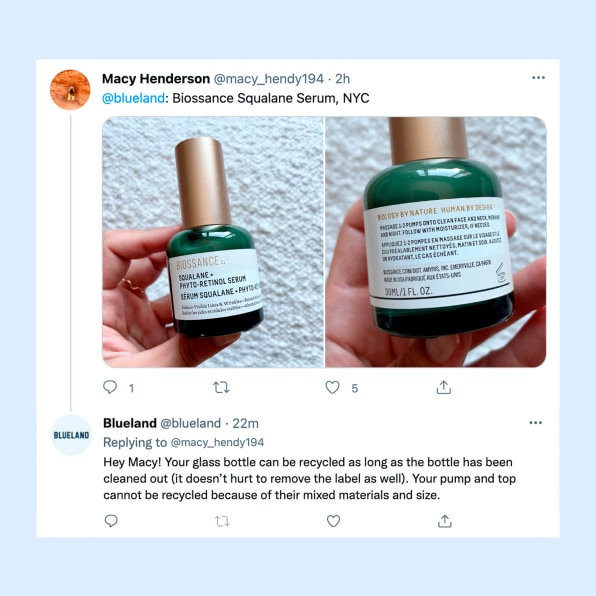Eco-friendly cleaning company Blueland is launching a Twitter service to help users recycle any beauty product—even from its competitors.

Plastic packaging is responsible for almost half of the world’s plastic waste. It’s particularly flagrant in the personal care and beauty industry, which globally produces 120 billion units of packaging per year. The bottles and packs themselves scarcely contain recycling instructions, and they end up in landfills, oceans, and our bloodstreams.
Reducing those harms is the basis of a new initiative from Blueland, an eco-friendly cleaning company. Today, it’s launching a social media service that lets anyone tweet at the company for advice on how to recycle a beauty product—from any brand—and it will respond with information on proper disposal.
The resource aligns with Blueland’s mission of reducing waste—though it stresses that the ultimate solution is not recycling, but rather to consume less plastic overall.

The process is straightforward: Just tweet @Blueland with the name of the product (ideally with a photo) and where you live, and a representative will respond with information about how to dispose of it responsibly.
“It’s very simple, and that’s the beauty of it,” says Sarah Paiji Yoo, the company’s cofounder and CEO. She says there will be someone from Blueland on hand at all times to field Twitter queries, but that respondents will be doing manual research on the material in question, so it may take some time to get back to the user.
Having lived a zero-waste lifestyle with her family for the past four years, Paiji Yoo herself often reaches out to customer service departments to ascertain product packaging information, and she knows it’s not always a straightforward process. She admits that there may be instances when despite their best efforts, her team won’t be able to provide a clear answer.
Paiji Yoo says packaging details are much more common on cleaning products, down to the type of plastic used, whereas on beauty items often “you can’t even discern what material it is.”
Many companies avoid it because they use the small bottle space to tout the product—and sometimes it’s simply not recyclable. “It’s not something that brands are excited to be shouting from the rooftops,” she says. It’s also not federally required to provide packaging material or recycling information on product labels.
Recycling policies vary drastically by state and municipality. In Seattle and Connecticut, for instance, by law residents can be fined if they throw away too many recyclable goods; Vermont has a landfill ban on certain items. Additionally, many U.S. municipalities don’t even recycle glass.
The hope at Blueland is to offer granular-level advice to those who reach out, down to whether or not to remove bottle caps, which is preferable in many areas, but not in New York, with its very advanced, single-stream recycling system. Because of the difficulty of finding some information, Paiji Yoo warns candidly: “I am afraid that sometimes our answer is going to be: We actually don’t know.”
Blueland has been a pivotal influence in refill-and-reuse methods in the cleaning industry. Its staple is its “forever bottle,” whereby customers buy a bottle once and refill it with the company’s solid-form soap and cleaning tablets (and add water), minimizing single-use plastics. The company estimates that its sales have saved a billion single-use plastic bottles since its launch in 2019. It recently branched out of its home-cleaning niche with a body wash, and today it’s adding a facial cleanser, which is also refillable.
Blueland’s Twitter service will accommodate all brands, including rivals; because the company’s mission is to reduce waste, it puts a lot of effort into education and awareness.
“There is such a massive opportunity for us to really impact the broader industry, and that’s something that we’re so proud of having done in the cleaning space,” Paiji Yoo says, noting that the more consumers know about the recycling process, the more it can also influence which products they choose to purchase in the future.
Paiji Yoo stresses that the Twitter service isn’t a gimmick, and says she wants to continue it as long as there’s demand for the information. But she underscores that recycling isn’t the end solution to curbing waste—it’s just one part. The goal is to replace disposables with reusable materials.
“[Recycling] is still an imperfect solution,” she says. “Ultimately, we need to just consume less.”
